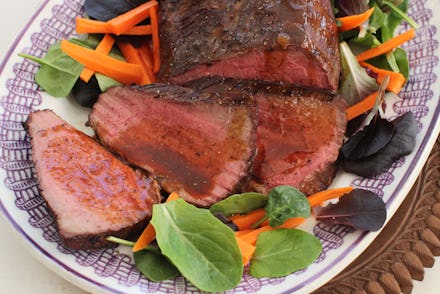Meat Is Killing Us, According to Science

Carnivores were dealt a crushing blow last fall when the World Health Organization declared processed meats are totally giving us cancer.
We screamed. We cursed science. We quietly wept as we cleared out our hidden stashes of bacon.
Now, Mayo Clinic researchers have set out to rub salt into our wounds. In a clinical review published in the Journal of the American Osteopathic Association, they set out to solve the query: Is meat killing us?
To reach their findings, the researchers reviewed six previous studies on meat and vegetarian diets and their effects on mortality — studies involving more than 1.5 million people, according to a release. They hoped to provide physicians with evidence-based guidance on whether they should tell their patients to stop eating meat.
Their conclusion? It's definitely killing us. "The evidence is consistent that increased intake of red meat, especially processed red meat, is associated with increased all-cause mortality," the researchers wrote.
Among the studies that took place in the Western world, the review also found a link between red meat and increased cardiovascular disease and cancer mortality.
For Brookshield Laurent, an assistant professor of family medicine and clinical sciences at New York Institute of Technology College of Osteopathic Medicine, the findings don't come as a shock. Laurent was not involved in the review.
"The high amount of sodium in processed meats contributes to hypertension, which is a risk factor for mortality due to heart disease," Laurent said in an emailed statement.
"What should also be considered is the lifestyle and other eating habits of those who consume a high amount of meat," she added. "Portion sizes, mode of food preparation, high carb intake and/or lack of exercise also contribute to the mortality rates we see."
Meanwhile, there's good news for vegans. Their diet has been shown to "improve several parameters of health, including reversal of cardiovascular disease, decreased BMI, decreased risk of diabetes and decreased blood pressure in smaller studies," the researchers wrote.
After reviewing the six studies, the researchers arrived at a recommendation for healthcare providers. Despite the study's various limitations, "avoidance of red and processed meats and a diet rich in plant-based whole foods, including fruits, vegetables, whole grains, nuts and legumes is a sound, evidence-based recommendation," they wrote.
If a patient doesn't want to cut out red and processed meats altogether, physicians should encourage them to at least limit consumption as much as possible.
"If we heed this information, the impact will be great," Laurent said. "A diet that is mostly vegetable-based can potentially decrease the rate of obesity and heart disease, which are correlated with many other diseases."
But according to Laurent, the bigger issue is teaching patients how to alter their lifestyles.
"As an osteopathic family physician, this one aspect of care takes time, and results may not be seen overnight," she said. "It takes an informed and motivated patient, with access to healthier options, to see impact."
These findings aren't anything new — just further evidence that you should eat less bacon and more kale. In addition to last fall's bacon bombshell, a 2015 government report found vegan diets are good for our health — and good for the environment too.
How much meat is okay to consume? Unfortunately, there's not one "tried-and-true right answer," according to Marci Clow, a registered dietitian at Rainbow Light. The suggestions vary depending on which guidelines you're referring to.
"Recommendations range between three to six three-ounce servings weekly," Clow said in an emailed statement. "As long as you are utilizing lean cuts that are not processed, consuming small portions, around three ounces, which is about the size of a deck of cards, a couple times per week is okay."
As for your beloved bacon, limit it — and other processed meats — to "only on occasion," she said.
If you want to eat more plants, but can't bear to give up meat, here's a fruit that tastes like pork. You're welcome.